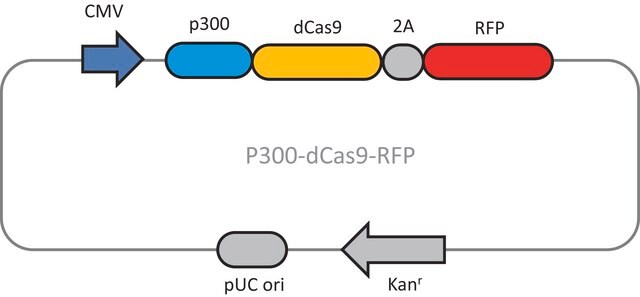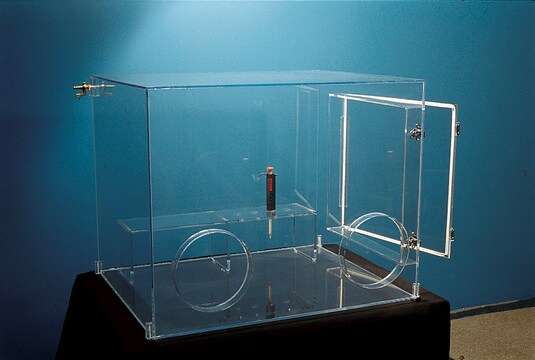DCAS9P300VP
Sigma CRISPR dCAS9-p300V Activator Lenti Plasmid
Iniciar sesiónpara Ver la Fijación de precios por contrato y de la organización
About This Item
UNSPSC Code:
12352200
NACRES:
NE.02
Productos recomendados
recombinant
expressed in E. coli
Quality Level
form
liquid
packaging
vial of 50 μL
concentration
20 ng/μL in TE buffer; DNA (1μg of plasmid DNA)
application(s)
CRISPR
shipped in
dry ice
storage temp.
−20°C
General description
This gene activation system is based on a fusion of inactive Cas9 (dCas9) to the catalytic histone acetyltransferase (HAT) core domain of the human E1A-associated protein p300. The dCas9-p300 activator lenti plasmids use the EF1 alpha promoter for strong expression of dCas9-P300 and blasticidin linked by a 2A peptide (EF1a-dCas9-P300-2A-Blasticidin) allowing for easy selection following successful transfection or transduction. Use Sigma′s lentiviral dCas9-P300 lenti plasmid for generation of lentiviral particles and efficient production of stable cell lines expressing dCas9-P300 for CRISPR based gene activation. The dCas9-P300 lenti plasmid is one part of a two part CRISPR system with individual dCas9-P300 and gRNA expression vectors.
To order gRNA in any format click here
To order gRNA in any format click here
Application
- Functional Genomics/Target Validation
- Epigenetic Modification
- Transcriptional Activation
- Manufacture of dCas9-P300 expressing lentiviral particles
Features and Benefits
The Sigma CRISPR dCas9p300V plasmid co-expresses p300-HAT and Blasticidin, allowing for blasticidin based selection of cells expressing dCas9p300. gRNAs can successfully direct nuclease-deficient Cas9 (dCas9) fused to p300 HAT catalytic domain to increase levels of histone acetylation and endogenous gene expression. The dCas9-p300 histone acetylation approach represents a distinct mechanism of action relative to dCas9-VP64 or other similar gene activation motifs.
Principle
CRISPR/Cas systems are employed by bacteria and archaea as a defense against invading viruses and plasmids. Recently, the type II CRISPR/Cas system from the bacterium Streptococcus pyogenes has been engineered to function in eukaryotic systems using two molecular components: a single Cas9 protein and a non-coding guide RNA (gRNA). Mutations to the catalytic domains, RuvC and HnH, render it inactive as a nuclease yet still allow for the protein to be programmed to target specific sequences of DNA with a single gRNA. A fusion of dCas9 to the catalytic histone acetyltransferase (HAT) core domain of the human E1A-associated protein p300 induces transcription by releasing DNA from its heterochromatin state allowing for continued and robust gene expression by endogenous cellular machinery. The dCas9-p300 CRISPR Gene Activator represents a distinct mechanism of action relative to dCas9-VP64 or other similar gene activation motifs
Storage Class
10 - Combustible liquids
wgk_germany
WGK 2
flash_point_f
Not applicable
flash_point_c
Not applicable
Elija entre una de las versiones más recientes:
Certificados de análisis (COA)
Lot/Batch Number
Lo sentimos, en este momento no disponemos de COAs para este producto en línea.
Si necesita más asistencia, póngase en contacto con Atención al cliente
¿Ya tiene este producto?
Encuentre la documentación para los productos que ha comprado recientemente en la Biblioteca de documentos.
Nuestro equipo de científicos tiene experiencia en todas las áreas de investigación: Ciencias de la vida, Ciencia de los materiales, Síntesis química, Cromatografía, Analítica y muchas otras.
Póngase en contacto con el Servicio técnico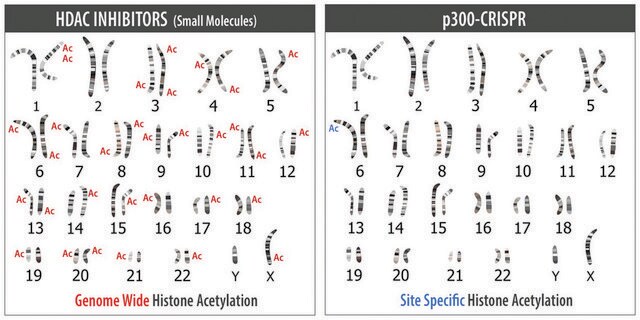
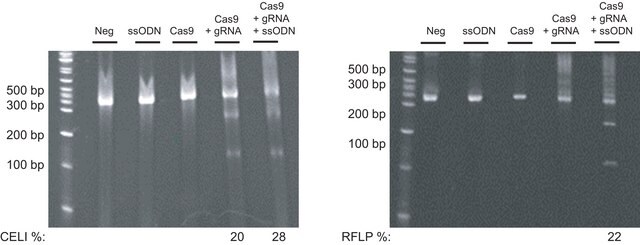
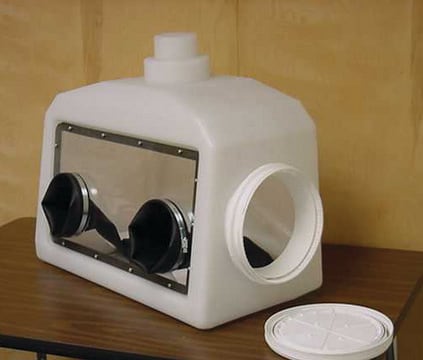
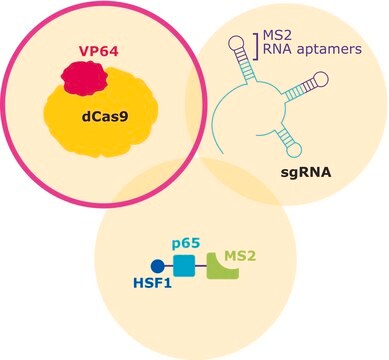

![4-Chloro-3′-formyl[1,1′-biphenyl]-3-carboxylic acid AldrichCPR](/deepweb/assets/sigmaaldrich/product/structures/219/139/39d5bc4d-aa7f-4428-90b0-a88b6d5d2ecb/640/39d5bc4d-aa7f-4428-90b0-a88b6d5d2ecb.png)

